Building your first team has never been harder — or more exciting.
The early hiring landscape is transforming fast, powered by AI-driven matching, founder-focused recruiting tools, and a new generation of platforms designed to help startups make their first key hires. What once depended on referrals, job boards, or cold outreach has evolved into a smarter, faster ecosystem that blends automation, human curation, and community. These platforms don’t just post jobs — they optimize for fit, intent, and speed, helping founders build high-signal teams that define their company’s future.
For founders, recruiters, and anyone fascinated by how startups form their earliest teams, this shift marks one of the most dynamic evolutions in tech. The latest wave of early hiring platforms combines data, design, and startup know-how to connect the right people at the right moment — whether for technical, creative, or leadership roles. It’s no longer about just filling positions; it’s about shaping the DNA of what a startup will become.
Here are eight early hiring platforms leading that change, each one catering to a different audience, from founders to recruiters to ambitious candidates ready to join the next big thing.
1. Juicebox
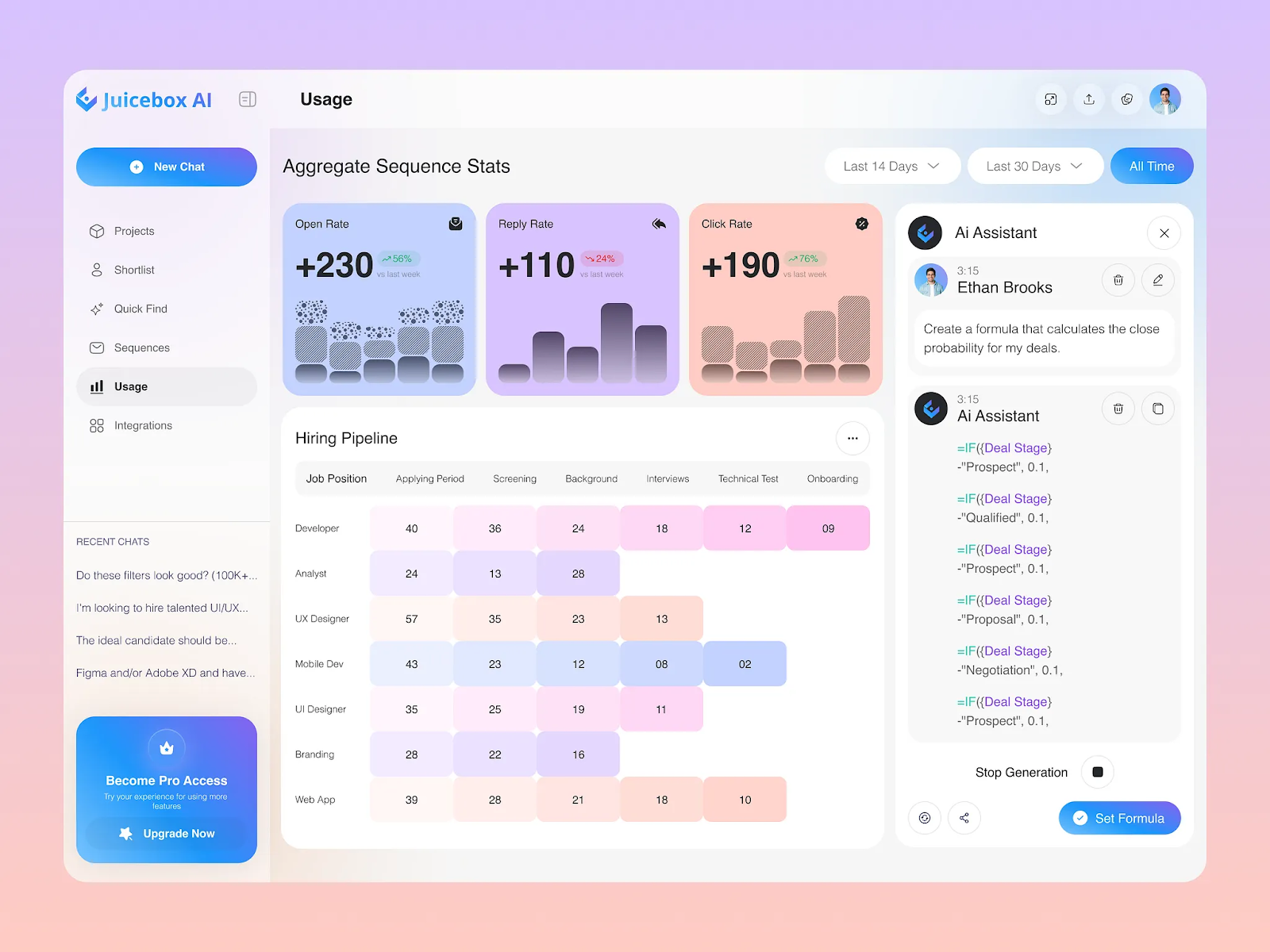
Juicebox is an AI-driven recruiting platform built around its core engine, PeopleGPT, which lets users find candidates by simply describing the role in plain language. It searches across hundreds of millions of public profiles, ranks them by relevance, and learns from your feedback to improve matches over time. Its autonomous sourcing agents keep working in the background, continuously finding and refining new candidates, while automated outreach tools handle personalized messages and follow-ups. Integrated analytics and ATS/CRM connections tie everything together, letting teams track engagement and move shortlisted candidates seamlessly into hiring pipelines. In short, Juicebox turns manual sourcing into a continuous, AI-assisted talent-discovery system designed for speed, precision, and scalability.

Pros of Juicebox
- Ideal for recruiters, founders, and hiring teams—built to streamline sourcing, automate outreach, and scale hiring efforts.
- A powerful AI engine searches hundreds of millions of profiles using natural language, making it easy to describe the talent you need. (PeopleGPT)
- Built-in personalized email sequences help recruiters contact candidates efficiently and track replies.
- Connects with major ATS and CRM systems—easy to plug into an existing recruiting workflow while offering strong data visibility, talent availability, engagement metrics, sourcing efficiency.
Cons of Juicebox
- Not built for job seekers—no candidate sign-up or application portal. You can’t apply for roles directly.
- Candidates can’t control how or when their data appears—visibility is passive, based on public profiles.
- Requires technical setup and a paid subscription; not a lightweight tool for casual users. Limited access to features with the free trial plan.
In essence, Juicebox reimagines recruiting as an AI-driven discovery process rather than a manual search-and-message grind. It empowers founders and hiring teams to act more like data-savvy talent scouts—automating the repetitive parts of sourcing while surfacing higher-quality candidates faster. Its strength lies in precision, scalability, and continuous learning through AI agents, making it especially useful for startups or recruiters hiring for hard-to-fill technical roles. However, it’s clearly a recruiter’s tool, not a candidate marketplace, so it shines behind the scenes—fueling better hires rather than providing a place for job seekers to apply.
2. CoffeeSpace
CoffeeSpace is a mobile-first networking and early hiring platform designed to help founders, builders, and early-stage talent find cofounders and first hires. Think of it as the “Tinder for startup builders,” but with smarter filters and a focus on meaningful professional matches. Instead of scrolling through job boards or cold-emailing potential teammates, users swipe through curated profiles of founders, engineers, designers, and operators looking to collaborate on new ventures or join early teams.
What makes CoffeeSpace stand out is its expansion to focus on the very first 5–10 hires—the people who often define a startup’s culture and direction. The platform uses a double opt-in match system (both sides must express interest), offers skill-based and mission-based filters, and integrates chat features for direct communication once a match occurs. Its UX is designed to feel natural and fast—mirroring social discovery apps—but built specifically for startup team formation, not casual networking.
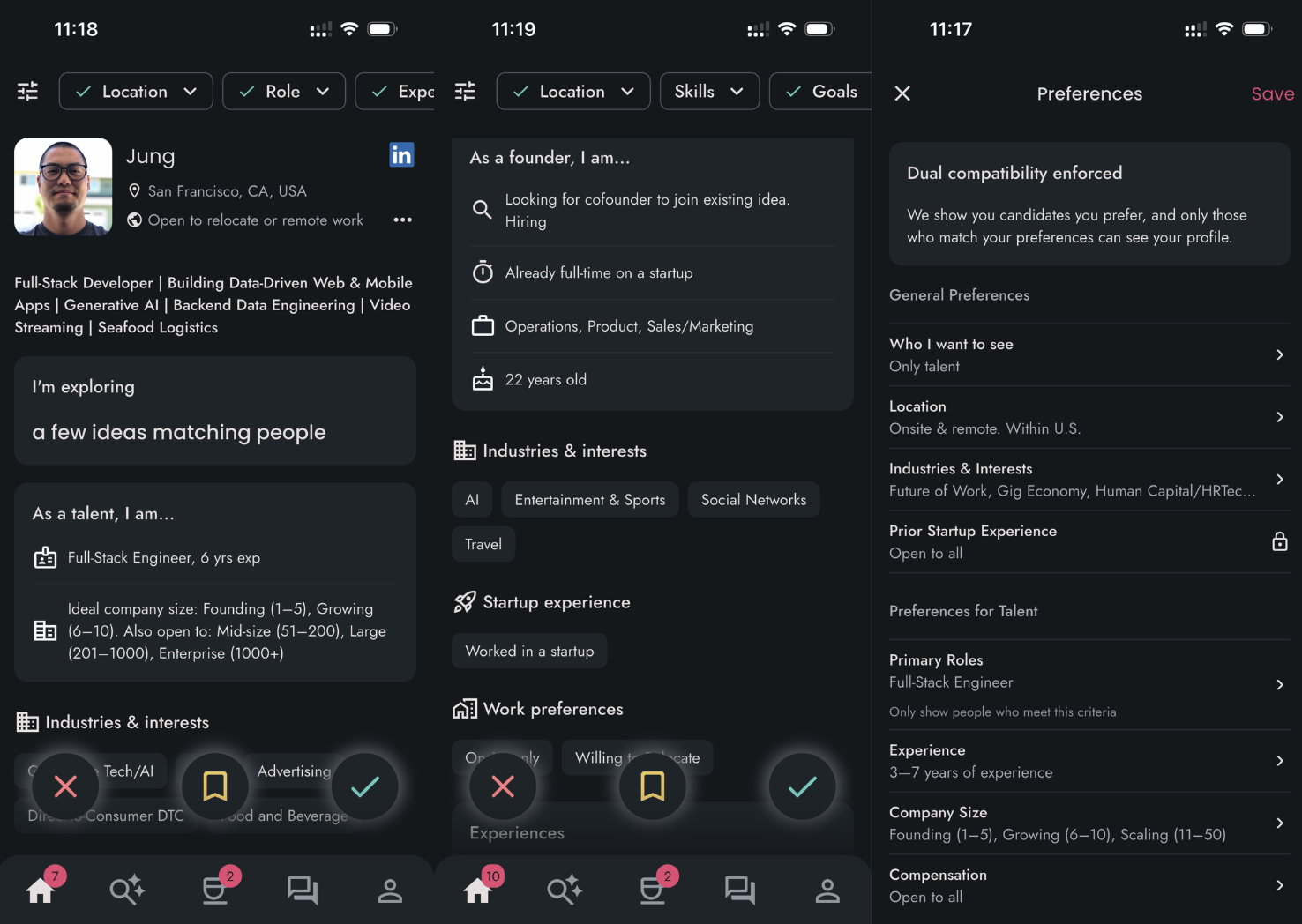
Pros of CoffeeSpace
- Tailored for early-stage founders and first hires, focusing on cofounder and early team formation rather than corporate recruiting.
- Mobile-first (iOS and Android), swipe-based interface makes discovery fun and intuitive; strong onboarding flow for clarifying goals, skills, and interests.
- Double opt-in ensures mutual interest before messaging; helps avoid spam and wasted outreach.
- Built-in chat and direct messaging make it easy to connect once matched; lightweight and immediate communication channel.
- Encourages authentic interaction around ideas and collaboration, not just jobs; integrates “coffee chat” prompts for organic networking.
Cons of CoffeeSpace
- Smaller user base compared to large job platforms; less suitable for later-stage hiring or non-startup roles.
- Matching relies on active users in your region or field—low density in some markets can limit matches.
- No advanced recruitment tools like applicant tracking, job posts, or candidate analytics—purely connection-focused.
CoffeeSpace fills a unique gap in the early hiring landscape—bridging social discovery and professional networking for founders who need to build their first team fast. Its mobile-native, swipe-based UX lowers the barrier to meeting potential cofounders or first hires, while the curated, startup-focused user base keeps the experience relevant and high-signal. It’s not designed for traditional recruiting or late-stage hiring pipelines; instead, its magic lies in those early, serendipitous connections that turn ideas into real companies. For founders seeking like-minded collaborators—or for early builders looking to join something from the ground up—CoffeeSpace delivers a modern, human way to meet the people who’ll help shape your next big venture.
3. Contrario
Contrario positions itself as a hybrid recruiting platform that combines the efficiency of AI with the expertise of human recruiters. Rather than being a simple job board or matchmaking app, Contrario operates as a managed talent marketplace, connecting startups and growth companies to pre-vetted recruiters who specialize in specific roles or industries. Its unique value lies in this blend of automation and human touch. Unlike self-serve platforms where founders must source candidates themselves, Contrario allows startups, especially early-stage ones without internal HR, to delegate that work to trusted recruiters who are augmented by data-driven matching algorithms. This makes it particularly useful for lean teams looking to fill critical technical or leadership roles without building a full recruiting function internally.

Pros of Contrario
- Ideal for startups needing expert help to fill early or niche roles; combines human recruiters with AI efficiency.
- Operates as a web platform with dashboards for clients and recruiters; supports integrated communication and tracking.
- Transparent pricing and likely lower than traditional recruiting agencies; pay for successful placements.
- Access to a vetted community of experienced recruiters who specialize in startup and tech hiring.
- AI tools that assist with candidate discovery, filtering, and matching, improving speed and reducing manual work.
Cons of Contrario
- Recruiting quality can vary slightly by individual recruiter, as it’s still a marketplace model.
- Lacks public-facing candidate discovery—everything is handled through the recruiter, not through browsing or swiping.
- No mobile app version currently; mainly web-accessible and service-driven.
- The AI is used to assist recruiters, not founders directly—so benefits are indirect unless you’re on the hiring side.
Contrario bridges the gap between traditional recruiting agencies and AI-driven hiring tools, offering startups a semi-outsourced, high-speed recruiting solution. Backed by Y Combinator, it matches founders with vetted recruiters who use AI to identify and engage top candidates efficiently. This managed approach lets lean teams fill technical or leadership roles quickly without building internal HR capacity. Best suited for founders who prefer to delegate hiring, Contrario delivers a balanced mix of automation, human expertise, and reliability—ideal for startups that need quality hires fast without sacrificing fit or precision.
4. YC’s Work at a Startup
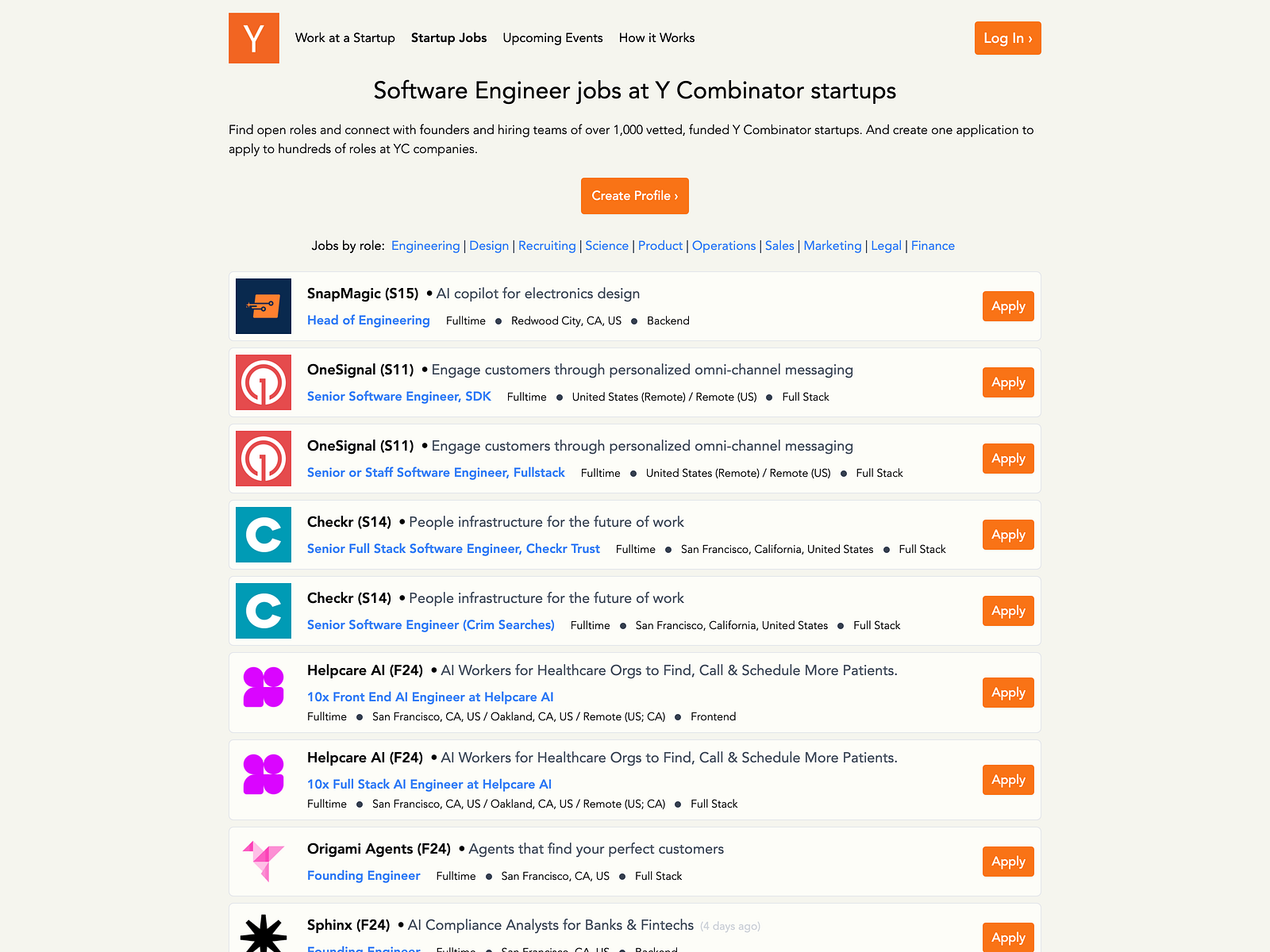
The platform Work at a Startup is a job-board and matching site run by Y Combinator that connects job-seekers with roles at YC-backed startups. Users create a single profile and apply once, and then the startup companies in the network browse those profiles and reach out to matching candidates. The idea is to reduce the friction of applying to many early-stage companies, especially for technical roles, and to give candidates access to hundreds (or thousands) of startups via one central application.
Pros of YC's Work at a Startup
- Gain exposure to many YC-backed or YC-affiliated companies (often early stage, high growth potential) via one profile.
- Ideal if you want to work in a startup environment (fast-paced, multiple hats, high growth).
- The platform is designed for startups to browse candidates, which means you may get inbound interest rather than constant outbound hunting.
- YC’s name carries credibility; working at a YC-backed company can carry professional signals.
Cons of YC's Work at a Startup
- The feedback loop is weaker for candidates: some users report minimal responses or transparency on application status.
- You may lack control over which exact role you’re applying for; some roles may not match your ideal preferences.
- The “YC brand” can draw a large applicant pool, meaning roles fill fast or get very high application volumes. Because it’s open to all YC and larger scale startups, the number of applicants is very large, competition is intense.
Work at a Startup offers a valuable gateway for job-seekers who are motivated to work at early-stage, growth-oriented startups, especially those connected to Y Combinator. It simplifies the application process and gives access to a broad network of companies. However, because of its wide reach and startup focus, users should be prepared for high competition, less control over individual role matches, and startup-specific trade-offs (pace, ambiguity, risk). If you’re looking for startup roles and are comfortable with that environment, this platform is a strong option; if you prefer very specific roles, slower growth organizations or more mature companies, it may be less ideal.
5. Sorce
Sorce is also a mobile-first, AI-powered job-search app that transforms the way job-seekers apply by combining a swipe-based UX (akin to a dating app) with automation behind the scenes: you upload your résumé once, swipe right on jobs you like, and Sorce’s AI agent handles the rest (forms, cover letters, submissions) automatically. It aims to reduce the grind of traditional job-hunting by offering “one-swipe apply” plus smart matching and tracking of applications.
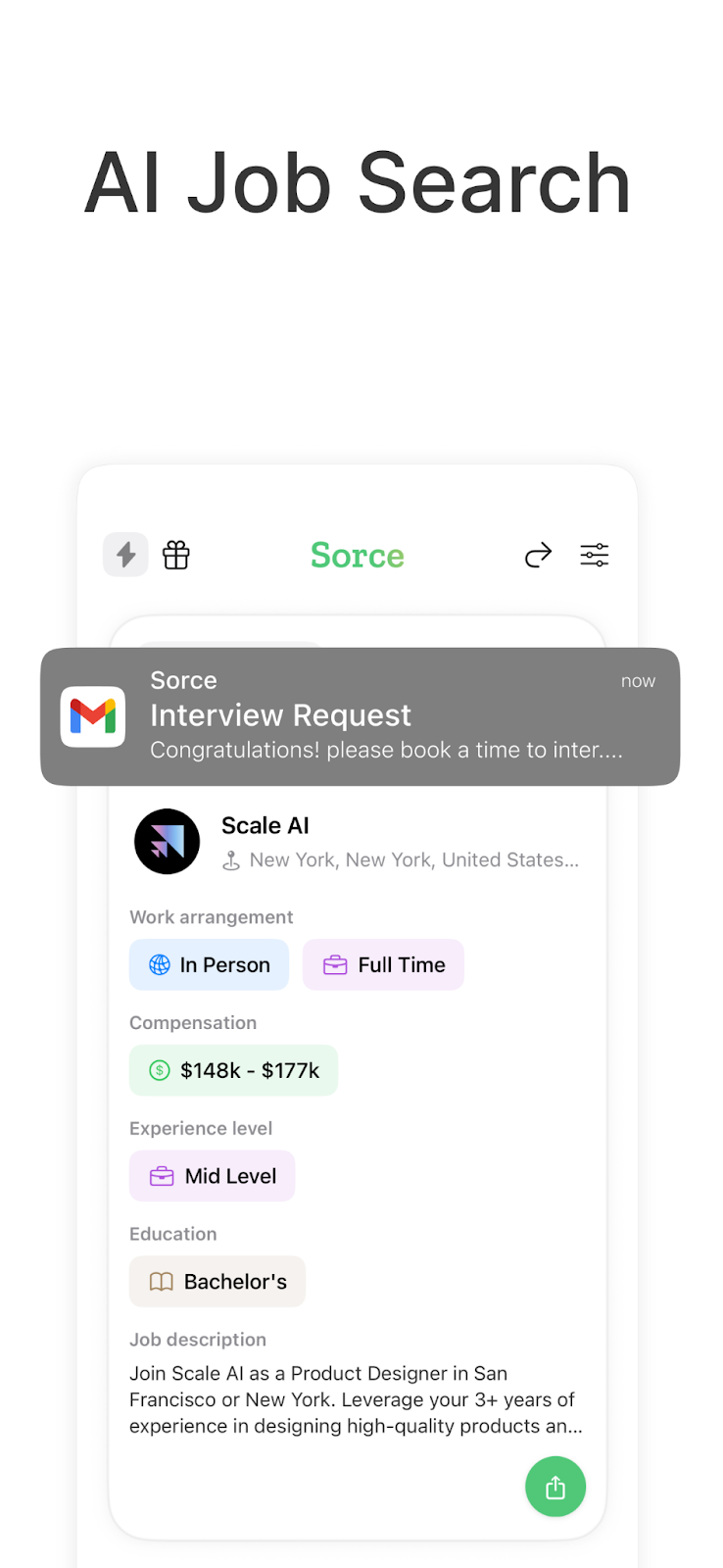
Pros of Sorce
- Extremely simple UX: swipe to apply. Great for reducing manual effort and quick applications. Designed for mobile usage, convenient on the go, modern UI.
- AI fills forms, generates cover letters, submits applications on your behalf—massively cuts time.
- You can start for free; a good concept for high-volume seekers or career switchers.
Cons of Sorce
- Because it’s newer and more experimental, there may be bugs, fewer filters, and less mature employer coverage.
- Risk of less control, errors or mis-submissions; you may not always see exactly what was submitted.
- Premium features/credits are comparatively expensive; some see value-issues.
Sorce offers a compelling alternative to traditional job-search platforms—especially for job-seekers who value speed, convenience, and mobile-first workflows. Its swipe-to-apply model and AI automation can dramatically reduce the time and effort of applying, which is a major plus for early-career professionals, career-changers or those casting a wide net. On the flip side, the model trades off some precision, control and filtering power: users may receive mismatched jobs, need to trust the AI agent’s submissions, and pay more for premium features. If you’re comfortable with a high-volume, mobile-centred job-hunt and willing to review what the AI submits on your behalf, Sorce can be a useful tool. But if you’re targeting very specific roles, industries or geographies with high selectivity and want full control over every application, you might still combine it with more traditional job-search methods.
6. Mercor
Mercor is a next-generation AI-powered talent marketplace designed to streamline and scale hiring for high-skill, global roles — particularly in fields like AI, engineering, legal, medicine, and research. Rather than being a simple job board, Mercor automates large parts of the recruitment workflow: candidates upload a resume, often complete a 20-minute AI-led interview, and then are matched via algorithmic scoring to roles. On the employer side, jobs are posted and Mercor’s AI (alongside a global talent pool) surfaces high-signal matches, onboarding and payment infrastructure included. The uniqueness lies in its end-to-end stack (sourcing → assessment → onboarding → payments) plus its focus on expert/contractor talent globally.
Read more about their founding journey here.

Pros of Mercor
- Automates multiple steps: AI interviewing, matching, contracting, global payments.
- For employers: high value for high-signal hires; model is aligned around successful placements.
- Access to very high-skill professionals across domains (engineers, PhDs, lawyers, etc.).
- Uses AI profiling & interviews to emphasise skills rather than purely credentials.
Cons of Mercor
- For candidates: application process may feel opaque; pricing models for employers (and by extension role types) are less public. Also feedback loops for candidates may be weak.
- AI-based assessments raise concerns: bias, transparency, candidate experience and whether metrics used really correlate with performance.
Mercor stands out as an AI-driven global hiring marketplace built for startups and companies seeking specialized, high-impact talent—especially in technical and expert domains. Its end-to-end automation, from AI-led interviews to skill-based matching and international payments, sets it apart from standard job boards. For skilled candidates open to remote or contract work, it offers a fast, data-driven path to global opportunities. However, Mercor’s focus on high-signal, expert roles means it’s less suited for conventional or local hiring. Overall, it’s a strong fit when you need to hire top talent fast and globally, but not ideal for routine or non-specialized roles.
7. Turing
Turing is a remote-engineering hiring platform that lets companies access pre-vetted, full-time software engineers from around the world. It uses an “Intelligent Talent Cloud” model: developers apply, undergo rigorous tests and interviews, then the platform matches them to roles with companies. On the employer side, you define the skills you need, and Turing delivers candidates within days, with managed onboarding, timezone overlap, and trial periods. Their focus is squarely on technical talent at scale, not generalist or local hiring.
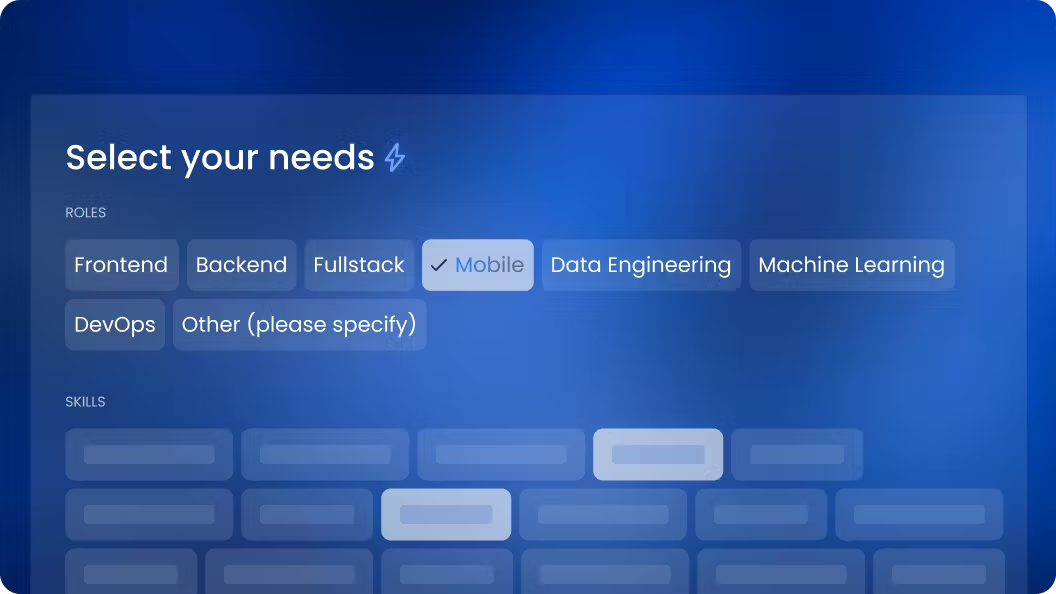
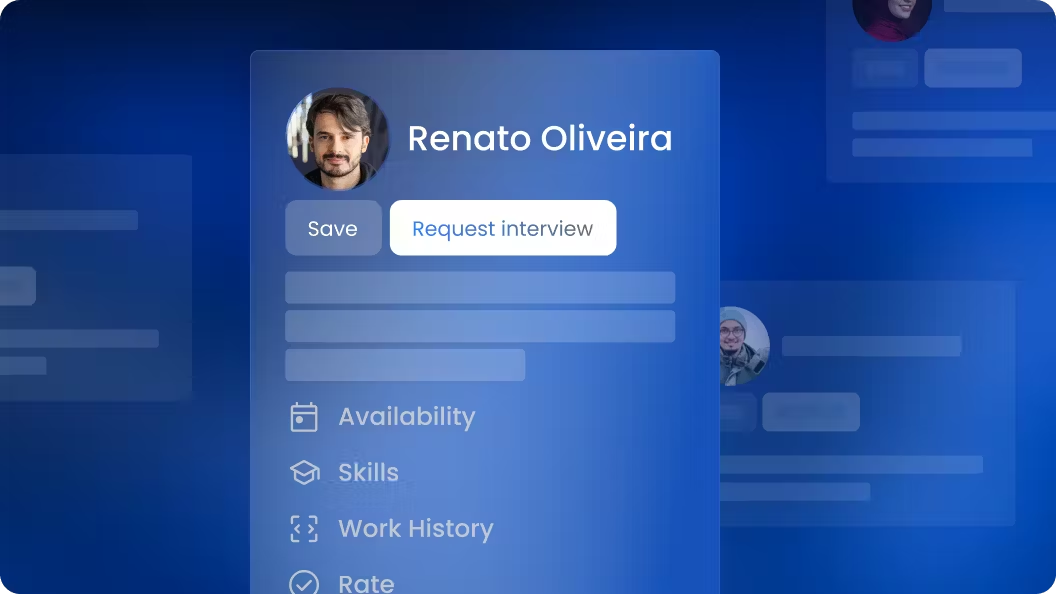
Pros of Turing
- Strong vetting: developers face multiple hours of coding/data-structure/system design tests to reach “top 1%” claims.
- Promises very fast matching for companies (roles filled in 3-5 days typical).
- Includes onboarding, remote collaboration tools, and a risk-free trial period for hires.
- Excellent for software engineering, especially roles needing senior, specialised skills.
Cons of Turing
- Less suitable for non-engineering or generalist roles (operations, admin, local hires) — the focus is heavily technical.
- For job-seekers: high barrier to entry; vetting is strict, and some candidates report scarcity of matching roles.
- Timezone overlap requirement (minimum of ~4 hours) may still create coordination challenges; cultural/communication fit may vary.
Turing stands out as a top choice when your hiring goal is to bring on remote, full-time software engineers with strong technical skills and you’re willing to use a managed, global platform. For a startup or scale-up in tech, it can dramatically reduce time-to-hire and tap into global talent that might otherwise be inaccessible.
However, if your hiring need is for non-engineering roles, or you prefer sourcing locally, part-time or traditional hire workflows, then Turing may be overkill or less suitable. For candidates looking for more flexible, less rigorous entry paths, the barrier is high. In short: powerful and efficient for tech-centric, remote-engineering hiring, but less ideal for other kinds of roles or more flexible hiring models.
8. Wellfound

Wellfound (formerly known as AngelList Talent) is a job-platform tailored for the startup ecosystem: it connects candidates with startup-minded roles and enables companies (primarily tech startups) to post jobs, build company branding, search candidate profiles, and hire. The platform emphasises startup-specific filters (such as company stage, funding, remote vs. onsite), salary/equity transparency, and “one-click apply” flows, making it especially suited for job-seekers who are looking to join an early-stage company, and for startups that want to tap into a talent pool of people motivated by startup culture.
Pros of Wellfound
- Strongly oriented toward startup jobs: many listings from seed to Series C startups and roles that might be hard to find on generic boards.
- Allows “one-click apply” once your profile is set up. Candidates can see salary and equity information upfront, which helps with transparency.
- For job-seekers: free to use; posting jobs (for companies) has free options, making the board accessible.
- Good for startups: built-in community of “startup-ready” professionals; good fit for roles where culture/fit matters.
Cons of Wellfound
- High competition for roles (popular startup jobs) means many applications per listing; may reduce visibility.
- Despite the streamlined flow, many users report low response rates and some listings go un-reviewed.
- Because it focuses on startups, roles outside tech or non-startup culture may be under-represented.
- As a company, to get premium sourcing tools (e.g., advanced candidate search) you may need paid tiers. For job-seekers, startup risk (e.g., fewer safeguards) may be higher.
Wellfound is a go-to platform for startup-focused talent, particularly in tech, design, and product roles. It stands out for its transparency, startup-specific filters, and fast, intuitive application flow, giving both candidates and startups access to a like-minded community. However, competition is steep, response rates can be inconsistent, and it’s less suited for traditional or non-startup roles. In short, it’s ideal for those who thrive in fast-moving startup environments, but not for those seeking corporate stability.
Conclusion
In the end, choosing the right early hiring platform comes down to understanding your goals — and where you fit in the ecosystem. Founders looking to build their first core team may find value in community-driven spaces like CoffeeSpace or managed recruiting hybrids like Contrario. Recruiters and headhunters might gravitate toward platforms that blend automation with precision, such as Juicebox or Mercor. And for candidates eager to join the startup world, Wellfound and YC’s Work at a Startup remain trusted entry points with strong visibility and reach.
What’s clear is that early hiring is no longer a one-size-fits-all game. The best platforms today don’t just match résumés to roles — they align ambition with opportunity, using data, networks, and human insight to accelerate growth at the earliest stage. Whether you’re building your founding team, sourcing niche talent, or searching for your next big move, these tools reflect a broader shift in how startups find their people: faster, smarter, and more intentional than ever before.

.png)